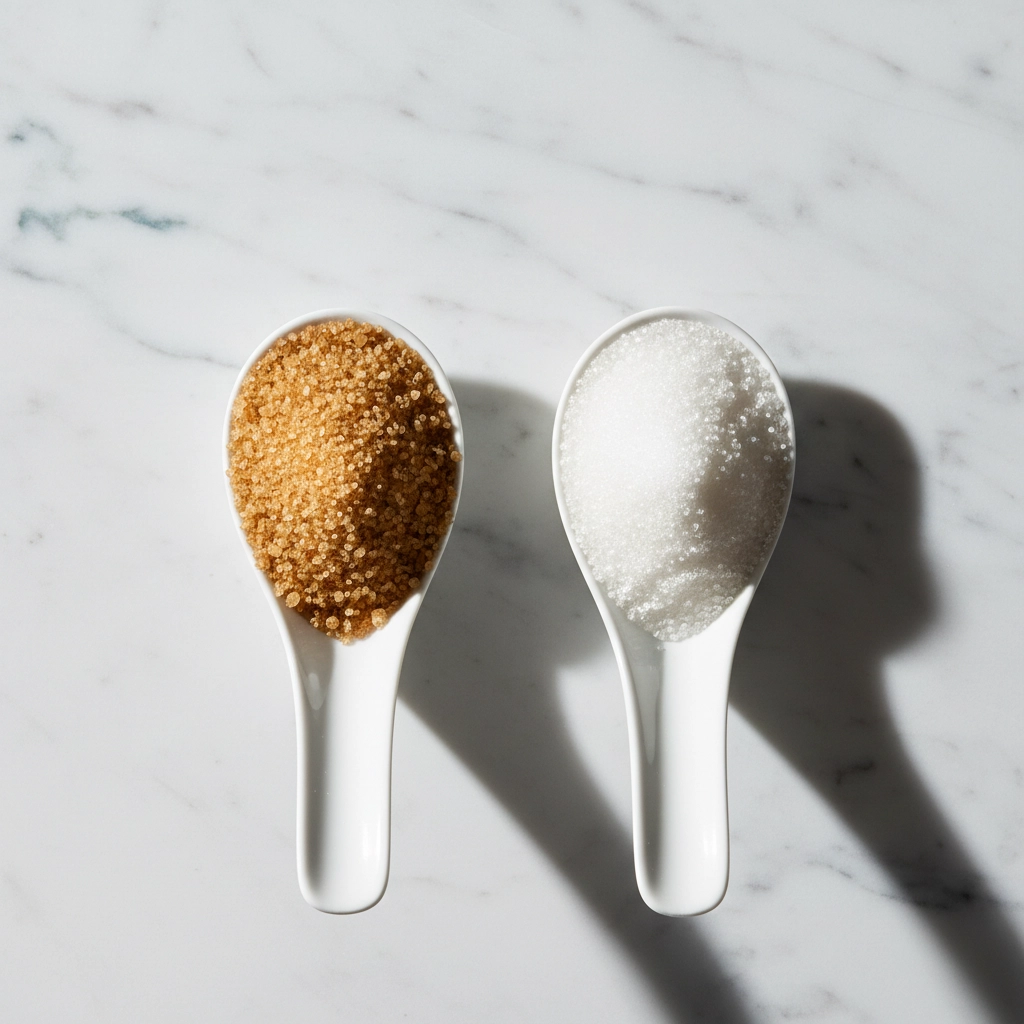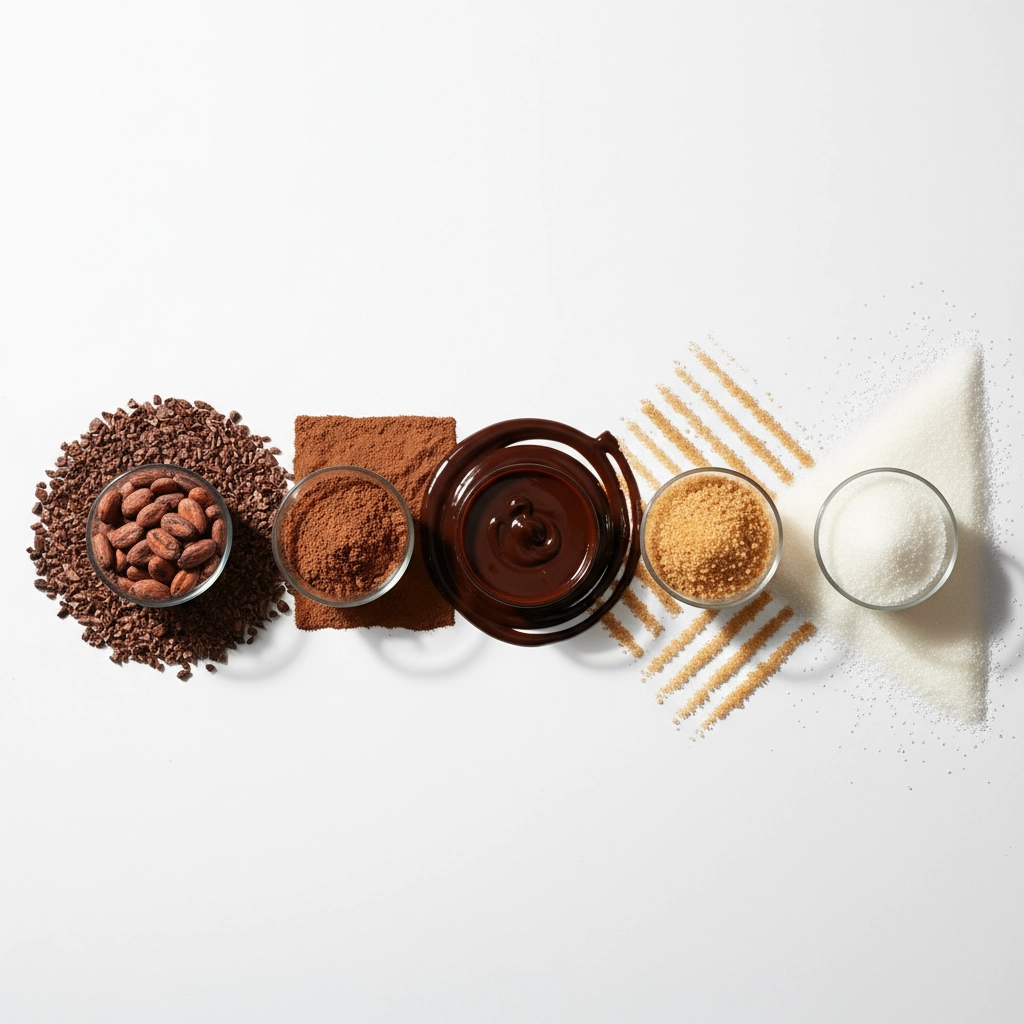Is Coconut Sugar Actually Better Than White Sugar?

Coconut sugar marketing claims suggest superior health benefits compared to white sugar. These claims require examination against scientific evidence and practical applications in chocolate production.
What Is Coconut Sugar
Coconut sugar derives from coconut palm tree sap. Producers collect sap from flower buds, then heat and crystallize the liquid into granules. The process maintains some original minerals and compounds from the palm sap.
White sugar undergoes refining from sugar cane or sugar beet. Manufacturers remove molasses, minerals, and color compounds to create pure sucrose crystals.
Nutritional Comparison

Coconut Sugar (per tablespoon):
- Calories: 45
- Carbohydrates: 12g
- Sugar: 12g
- Minerals: trace amounts of iron, zinc, calcium, potassium
- Contains inulin fiber in small quantities
White Sugar (per tablespoon):
- Calories: 48
- Carbohydrates: 12.6g
- Sugar: 12.6g
- Minerals: none
- No fiber content
The nutritional profiles show minimal differences. Coconut sugar contains 6% fewer calories per tablespoon. The trace mineral content requires consuming large quantities to achieve meaningful nutritional impact.
Glycemic Index Analysis
Glycemic index measurements for coconut sugar vary across studies. Some research indicates a GI of 35 for coconut sugar versus 60-65 for white sugar. Other studies report coconut sugar at 54 compared to white sugar at 60.
A 2022 clinical study examined 43 participants with type 2 diabetes. Results showed no significant difference in blood sugar responses between coconut sugar and cane sugar consumption. This finding challenges marketing claims about coconut sugar's superior glycemic properties.
The inulin fiber in coconut sugar may slow sugar absorption. However, the quantity present appears insufficient to create substantial metabolic advantages.
Impact on Chocolate Production

Sugar selection affects chocolate texture, flavor, and processing requirements. Both coconut sugar and white sugar function as sweeteners, but their characteristics differ in chocolate applications.
Flavor Profile:
Coconut sugar introduces caramel and molasses notes to chocolate. This flavor addition may complement dark chocolate but can overpower delicate milk chocolate profiles. White sugar provides neutral sweetness without flavor interference.
Texture Considerations:
Coconut sugar crystals are typically larger and less refined than white sugar. These characteristics can affect chocolate smoothness during conching processes. Longer processing times may be required to achieve desired texture.
Moisture Content:
Coconut sugar retains higher moisture levels than white sugar. Increased moisture affects chocolate shelf stability and tempering processes. Chocolate manufacturers must adjust formulations to compensate for moisture variations.
Cost and Availability Factors
Coconut sugar costs significantly more than white sugar. Price differences range from 3-10 times higher depending on supplier and quality grade. This cost impact affects chocolate production economics and final product pricing.
Supply chain considerations also differ. White sugar maintains consistent availability through established global markets. Coconut sugar availability fluctuates based on coconut palm harvests and regional production capacity.
Processing and Purity Levels
White sugar undergoes purification processes. These processes remove impurities, minerals, and color compounds to achieve consistent quality standards. The resulting product maintains uniform characteristics across batches.
Coconut sugar processing varies between producers. Some maintain minimal processing to preserve nutrients, while others employ similar refining techniques to white sugar. Quality consistency can vary significantly between suppliers.

Health Claims Evaluation
Marketing materials frequently position coconut sugar as a healthier alternative. Scientific evidence does not support significant health advantages over white sugar consumption.
Mineral Content Claims:
Coconut sugar contains trace minerals including iron, zinc, calcium, and potassium. These quantities remain nutritionally insignificant. Consuming adequate amounts to achieve mineral benefits would result in excessive sugar intake.
Antioxidant Properties:
Some coconut sugar varieties contain polyphenols and antioxidants. Research has not established meaningful health benefits from these compounds at typical consumption levels.
Digestive Benefits:
Inulin fiber content may provide minor digestive benefits. The quantities present are insufficient to create significant prebiotic effects or digestive improvements.
Practical Chocolate Making Applications
Byron Bay Cacao evaluates sugar options based on flavor contribution, processing compatibility, and cost effectiveness. White sugar provides consistent performance across product ranges.
Coconut sugar works effectively in specific chocolate applications where caramel notes enhance flavor profiles. Dark chocolate varieties benefit from coconut sugar's complexity. Milk chocolate and white chocolate products typically require neutral sweetening.
Recipe Substitution Guidelines:
Direct substitution requires consideration of flavor and moisture differences. Coconut sugar adds approximately 30% more moisture than white sugar. Recipes may require liquid reduction to maintain proper consistency.
Temperature control becomes more critical with coconut sugar due to moisture content. Chocolate tempering processes may need adjustment to achieve optimal results.
Consumer Perception and Marketing
Consumer demand for natural and minimally processed ingredients drives coconut sugar popularity. Marketing emphasizes coconut sugar's natural origins and processing methods compared to refined sugar.
Price premiums reflect perceived health benefits rather than substantive nutritional advantages. Consumer education about actual nutritional differences remains limited.
Marketing Claims: "Refined Sugar Free" Explained
- Market positioning: Some brands promote coconut sugar–sweetened products as "refined sugar free" and "healthier."
- What "refined" technically means: Refining is a series of processing steps that purify or standardize a sugar. For cane/beet sugar, this typically includes clarification, filtration, centrifugation, crystallization, and decolorization to produce near‑pure sucrose. For coconut sugar, producers heat and concentrate sap, then granulate, sieve, and sometimes filter or centrifuge to stabilize color, flavor, and particle size. These are refining steps, even if milder than those used for white sugar.
- Is coconut sugar refined sugar-free?
- Marketing definition: usually "no refined cane or beet sugar added." By this meaning, products sweetened with coconut sugar can claim "refined sugar free" while still containing sugar.
- Technical definition: "no refined sugars of any kind." By this meaning, coconut sugar is not refined sugar-free because it is processed and refined from sap into a stable granulated or crystalline sugar.
- Bottom line for health-conscious readers: Coconut sugar is still sugar. It contributes similar calories and glycemic impact per serving. Trace minerals and inulin do not offset its sugar load. Choose based on flavor preference and total sugar intake, not on "refined sugar free" claims.
- Label-reading tip: If you wish to avoid cane/beet sugar specifically, look for "coconut sugar," "coconut blossom sugar," or "coconut nectar" on the ingredient list. If your goal is to reduce refined sugars altogether, limit added sugars regardless of source.
Scientific Consensus
Research consistently demonstrates minimal health differences between coconut sugar and white sugar. Both products provide similar caloric content, carbohydrate composition, and metabolic effects.
The 2022 diabetes study represents current scientific understanding. Blood sugar responses show no clinically significant differences between sugar types. Previous glycemic index studies may not reflect real-world consumption patterns.
Byron Bay Cacao's Sugar Selection
Our chocolate selection prioritizes flavor quality and ingredient consistency. White sugar provides reliable sweetening without flavor interference in most products.
Specific product lines incorporate coconut sugar where caramel notes enhance the chocolate experience. These applications target consumers seeking flavor complexity or following trends rather than health benefits.
Conclusion
Coconut sugar is not significantly better than white sugar from nutritional or health perspectives. Minor differences in mineral content and glycemic response do not justify health claims or premium pricing.
Chocolate production applications may benefit from coconut sugar's flavor contributions in specific contexts. However, white sugar remains the superior choice for most chocolate manufacturing requirements.
Consumers seeking reduced sugar intake should focus on overall consumption reduction rather than sugar type substitution. Both coconut sugar and white sugar contribute similar caloric and metabolic impacts.
Quality chocolate production emphasizes ingredient balance and flavor harmony. Sugar selection should prioritize these factors over marketing claims about health benefits.
